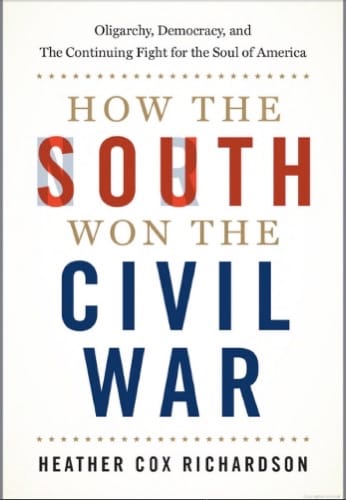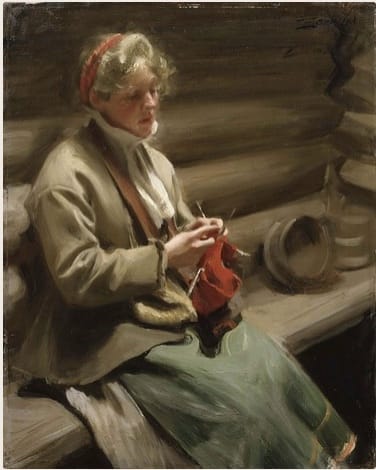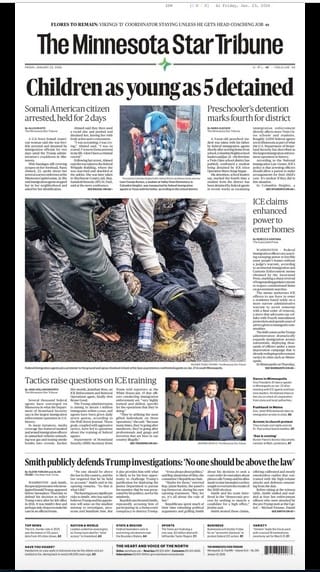Malice

I am a little over halfway through Heather Cox Richardson's provocatively titled 2020 book, How the South Won the Civil War. The subtitle sums up her view of the ongoing aftermath: Oligarchy, Democracy, and the Continuing Fight for the Soul of America. I was planning to finish the book before writing about it, but Cox Richardson's August 7 letter, published today, changed my mind.
Her letter considers the implications of the president's call for a new census yesterday, and she focuses on the issue of human rights abuses. The throughline for this subject is so clear and repugnant—the first half of her book documents so many of those abuses committed in this country's history—that it feels important to amplify her analysis today with some examples from her book.
Three Crucial Paragraphs
In addition to the illegality and impracticality of the president's called-for changes, Cox Richardson warns that making people "not count" does just that. It makes them cease to have standing:
"If undocumented immigrants aren’t counted, their districts will be shortchanged on representation and whatever federal monies are still available for states, for sure. But if undocumented immigrants aren’t counted, will they be easier to dehumanize? Already the government is taking people from the streets and denying their right to due process. Observers are describing human rights abuses in detention facilities where most of those incarcerated have no criminal record. If undocumented people are not officially recognized as existing, they could simply disappear."
Both the current mistreatment, and the push to expand the dehumanization are urgent enough (on top of a police and carceral system that already virtually disappears people of color by killing or imprisoning them), but she describes it as part of a larger picture:
"Yesterday Adam Taylor, Hannah Natanson, and John Hudson of the Washington Post reported that, according to leaked drafts of the annual report on human rights from the State Department, the Trump administration plans to back away from criticizing El Salvador, Israel, and Russia for their extensive human rights abuses. In 2024, the State Department reported government-sanctioned killings, torture, and 'harsh and life-threatening prison conditions”'in El Salvador; the new report says there are 'no credible reports of significant human rights abuses' in the country. Last year’s report for Israel was more than 100 pages; this year it is 25."
We've already seen this regime's efforts to pull the U.S. out of long-standing international aid functions. Now it is signaling the intent to countenance human rights abuses in countries it is interested in "making deals" with or otherwise supports.
The implications of this become even clearer with Cox Richardson's next observation:
"The State Department has also declared support for the end to presidential term limits in El Salvador. This change enables Salvadoran president Nayib Bukele, who allowed Trump to render Venezuelan immigrants to his infamous CECOT prison, to hold office indefinitely, establishing himself as a dictator. A spokesperson for the State Department said: 'El Salvador’s Legislative Assembly was democratically elected to advance the interests and policies of their constituents. Their decision to make constitutional changes is their own. It is up to them to decide how their country should be governed.'”
Each of these three paragraphs sets off alarm bells. Though Cox Richardson does note a few examples of resistance in her letter, we clearly need more and stronger efforts. The first step is simply making sure people understand the gravity of the situation. The public must wake up to the fact that the administration's attempts to turn back the clock in this country are dangerous assaults on human rights and democracy.
An Old Animus Arising
As difficult as it is for many to see, the threat is real: this administration is appealing to age-old white supremacist ideas that still have power and a pool of willing adherents. As Cox Richardson's book lays out, this situation, and its underlying mythology, is embedded in the country's inception.
The book starts with early colonial life, describing how the Virginia Colony worked to "split the lower classes apart along racial lines," after they had united in Bacon's Rebellion. The leadership also worked to further subjugate the native population: "from 1670 to 1715, colonists enslaved between 30,000 and 50,000 Indians. Entire tribes disappeared, and white farmers moved onto their lands"(18).
The creation of the Virginia Slave Codes in 1705 drew starker lines meant to separate workers and elevate white servants over black slaves. Any egalitarian notions that developed arose from a consolidation of a white male identity, in contradistinction to nonwhites. Thus, those men who were created equal were always already only white males.
"From its founding," Cox Richardson asserts, "America has stood at the nexus of democracy and oligarchy" and "its history of conflating class and race gave an elite the language to take over the government and undermine democracy"(22). This white identity was enforced in various ways. In the 1800s, working class white people could be "accused of being closet abolitionists" for supporting worker's rights or being friendly to black people, and might be "whipped out of town or lynched as an example to others" (34).
Colonizing the West
With westward expansion though, it was much more dangerous to be Native American, Mexican, or Chinese. The gold rush brought out the forms of dehumanization Cox Richardson's letter warns us of, as angry white miners "began to hunt Indians down, blaming them when their own luck in the mines didn't pan out. They tried to get rid of the Mexicans first by stealing their mules and money, then by threatening them, and finally by violence." This violence took extreme forms:
"At least 163 Mexicans were lynched in California between 1848 and 1860, a rate comparable to that of black Americans in the American South in the early part of the twentieth century. The mobs often mutilated the corpses, cutting out their tongues, hacking them into pieces, or burning them after the hanging, practices that underscored that they did not see Mexicans as fully human" (62).
California law reinforced the notion that only whites truly had rights: people of color were not allowed citizenship and could not testify against whites. Other racial categories also began to be promoted in the North, as the Know-Nothing party arose, declaring that Irish immigrants should be denied the vote because they were "n——rs turned inside out" (67). By 1855, Lincoln told a friend, "I am not a Know-Nothing . . . How could I be? How can any one who abhors the oppression of negroes, be in favor of degrading classes of white people? . . . When it comes to this I should prefer emigrating to some country where they make no pretence of loving liberty—to Russia, for instance, where despotism can be taken pure and without the base alloy of hypocr[is]y" (68).
"Indian Wars" and the Civil War
The 1860s brought more conflicts with Indians, as forts and settlers expanded into western territories, and with this, more dehumanization. Territorial governors and military leaders were unequivocal in their stated desire to kill Native Americans, even those asking for a truce.
Again, the violence was extreme: in 1863, the military killed Mangas Coloradas, an Apache leader attempting to negotiate a peace. "The army surgeon boiled his head," Cox Richardson states, "and sent his skull to famous New York City phrenologist Orson Squire Fowler" (72). More atrocities followed, among them the Colorado Sand Creek Massacre in 1864, during which the soldiers "didn't simply attack and kill unarmed Indians" (25 men, and over 100 women and children), "they butchered their victims, taking body parts as trophies" (74).
Instead of provoking outcry this massacre, Cox Richardson believes, contributed to a change in attitude even among those in the North and East:
"In 1864, most Americans had a son or a brother or a father wearing an army uniform. No one wanted to believe that a soldier—someone who could be their kin—would cut off a man's testicles to use them as a tobacco pouch. So they dehumanized the victims of the massacre. Indians were not people; they were savages who had forced the soldiers to kill them and treat them so brutally." (74)
Winning in the West
After the Civil War, Cox Richardson argues, the Confederate worldview nonetheless carried forth into the social and political formations of the western states, aided by the myth of the individualistic, hard-working cowboy. She points out that by the end of the century,
"the new western states were far more in line with the hierarchical structure of the South than with the democratic principles of the Civil War Republicans. Their political orientation reflected the reality of the western economy, which looked more like that of the Antebellum South than that of the antebellum North. By 1890, a few extractive industries dominated the West. Just as in the antebellum South, those industries depended on poor workers—often migrant workers—and a few men . . . controlled both the industries and politics" (103) .
These white men conducted their business affairs—mining, the railroads, the cattle industry—from a belief in their own supremacy, and when they entered politics or influenced legislation, it was with their own dominance, not democracy, in mind.
The precedents all exist in this country—precedents for an oligarchic leadership, intent on using workers and people of color solely for their own profit and power. We may believe ourselves still protected by the rule of law, by judges and courts. If we are of a certain class and race, we may assume that the norms we've always taken for granted will somehow endure.
But every day, the dragnet is being expanded across every community. What was an already inhumane immigrant detention system is now being pumped full of money and malice, to establish concentration camps. Innocent people are being detained, deported, rendered, tortured, traumatized.
Dehumanization won't stop until we stop it.




